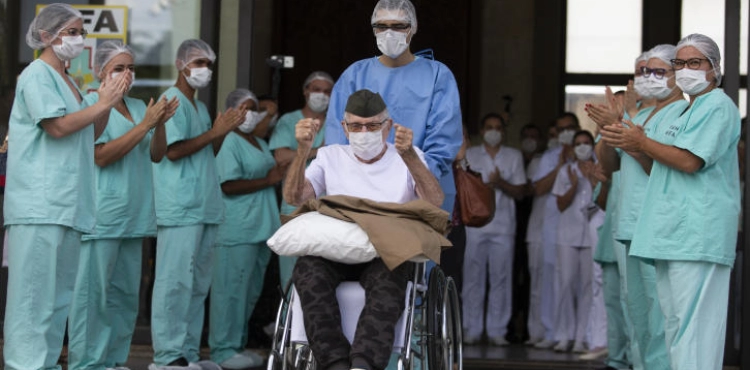Dr. Valdelia Veloso is running a race over time. For reasons not least, President Jair Bolsonaro.
As Brazilians increasingly dismiss health warnings calling on them to stay at home, encouraged by their far-right boss who likened fear of Covid-19 to "hysteria", expectations for how the pandemic will spread in the most affected country in Latin America are worsening.
With a population of 210 million, Brazil has recorded 1,532 deaths from the virus so far. But the state of Sao Paulo alone expects 111,000 deaths over a six-month period, which is almost equal to the total global death to date.
It is feared that health systems will collapse in a large number of its states, including São Paulo and Rio de Janeiro, the second worst affected, and Amazonas, a huge region with a large number of indigenous communities that have a tragic history with new diseases.
Veloso, the head of the main hospital fighting Covid-19 in Rio de Janeiro, says her staff is already exhausted and ill and has gone out of protection.
The hospital, whose official name is the National Institute of Infectious Diseases, is in full swing to build a new 200-bed intensive care facility, train new staff, and purchase the few available respirators and face masks.
What happens if they are not ready for the influx of patients expected to start later this month? "I try not to think about that ... It raises a lot of tension. When I think about it, I think about all the deaths that we will face here, and how we will receive numbers far beyond our energy. The rich will not be harmed as will the poorest," Veloso said. , Those who live in slums. " The crowded slums of shantytowns are sometimes found alongside the affluent neighborhoods of Brazil.
Brazil is known for its tumultuous festivals, hot and humid climate, its gigantic, vibrant cities, and its vast expanse of space.
Wave riders in Rio de Janeiro, anti-social isolation protesters in São Paulo and those who simply need to work, are increasingly violating measures at the country or local level to "flatten the curve" of a pandemic spread or reduce the number of infected people.
In São Paulo, the proportion of the population that remains in their homes has fallen to 47 percent, according to website tracking based on cellular phone site data, which is much less than the targeted 80 percent.
The first violator was Bolsonaro, who likened the new Corona to a "simple flu" and condemned the economic impact of housekeeping measures and prided itself on violating them, insisting on "my constitutional right to come and go as I wish."
Dr. Veloso said she was concerned about the apparent decline in social estrangement. "It is the only opportunity that can prevent us from collapsing the health care system."
There are many troubling signs. In São Paulo, at least five hospitals occupy more than 70 percent of the ICU beds in which patients have COFED-19, which is increasing rapidly.
A study predicts that the municipal health system will collapse by 19 April, if the social divergence measures are not intensified. Rio´s health minister Edmar Santos said that his mandate could deal with about 16,000 hospital admissions, but he feared the number could reach between 40,000 and 50,000.
Rio Wilson Governor Witzel, who is fighting himself against the virus, said the state could run out of artificial respirators by April 28.
In Amazonas, the health system is already on the verge of collapse. In its capital, Manaus, there is only an intensive care unit serving its 50-bed family with a mandate more than four times the size of Germany. Brazilian media reported that new patients had to wait for someone to die to be admitted.
The government has started building field hospitals to enhance the capacity to absorb more of these cases. It urgently supplies respirators and medical supplies, and deployes more than 1,000 nurses and 80 doctors to enhance the capacity of medical staff.
"The (infection) curve in Manaus is very close to the health system capacity line ... So we are trying to move this line to increase the capacity to receive more patients," Health Ministry official Joao Gabardo said on Saturday.
But there are limits to how quickly and how things can move.
Public health officials have said that getting vital supplies and equipment such as masks and respirators is becoming increasingly difficult, as international suppliers impose prices that are sometimes four times the normal price.












